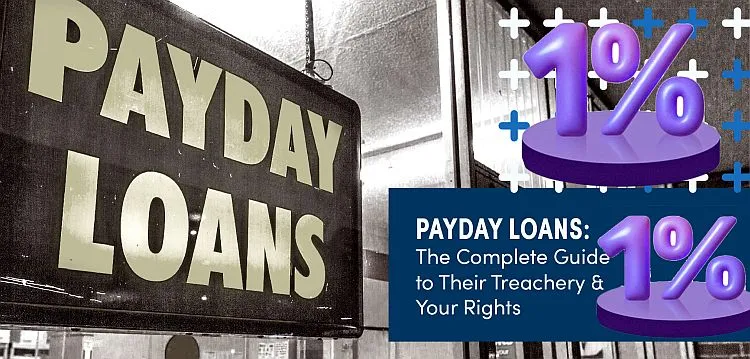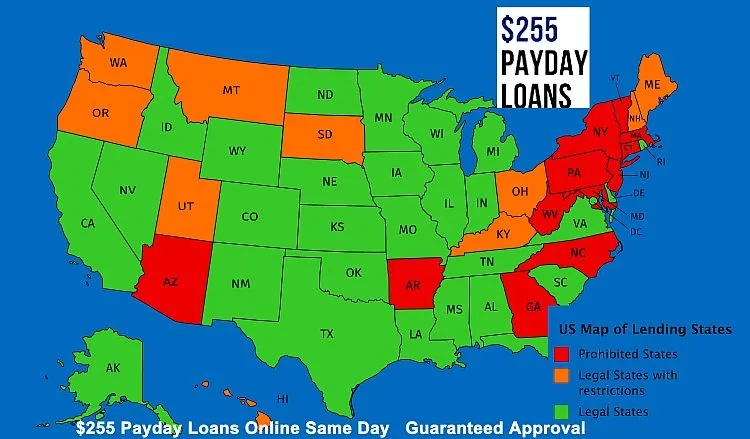Payday Loan How to Get One, and Legality in December 2023
What Is a Payday Loan?
Payday loans are typically short-term loans with high interest rates that are based on your income. The loan amount is usually a portion of your upcoming paycheck. These loans exploit the borrower’s urgent need for credit by imposing interest rates that are higher than the norm.
HERE ARE THE KEY TAKEAWAYS:
- Payday loans are short-term loans with very high-interest rates that are offered to consumers.
- These loans are typically based on the borrower’s income, and when applying for one, a pay stub is usually required.
- However, it’s important to note that payday loans are not available in all states.
- In fact, payday loans are prohibited in sixteen states, including Arizona, Arkansas, Colorado, Connecticut, Georgia, Maryland, Massachusetts, Montana, New Hampshire, New Jersey, New York, North Carolina, Pennsylvania, South Dakota, Vermont, West Virginia, Columbia.
- Over the years, several laws have been enacted to regulate the exorbitant fees and interest rates associated with payday loans.
Understanding a Payday Loan
Payday loans are a type of unsecured credit that doesn’t require collateral. However, they are frequently regarded as predatory lending due to their exorbitant interest rates, concealed fees, and the lender’s lack of consideration for the borrower’s ability to repay the loan.
Unfortunately, the high costs associated with payday loans often lead consumers into a debt trap, making it highly challenging to escape the burden of accumulated debt. Before resorting to a payday loan, it’s crucial to explore alternative options, such as safer alternatives like personal loans.
Readmore Bank of America Promotions December 2023
How Payday Loans Work
Payday loan providers typically require proof of income, such as pay stubs from your employer, before lending you a portion of your upcoming pay. These loans usually have a short repayment period, often 30 days or less.
It’s important to note that payday lenders assume a significant level of risk as they typically do not assess your ability to repay the loan. Consequently, they often impose high-interest rates and fees, particularly if you fail to meet your repayment obligations.
This situation can be problematic for borrowers, potentially leading to a cycle of borrowing to cover the costs of previous loans.
How to Get a Payday Loan
Payday loans can be conveniently applied for online through various loan providers. Alternatively, local providers, often small lenders with physical stores, also offer payday loan services.
To initiate a payday loan application, you will typically need a bank account and a government-issued ID. Employed individuals can provide proof of income through their work pay stubs. The loan amount is usually a percentage of your income.
It’s important to note that, in some cases, your wages may serve as collateral, allowing the lender to deduct a portion of your wages for loan repayment automatically. Credit checks and the ability to repay the loan are generally insignificant factors in the application process.
How to Get a Small Loan With No Credit in Policy 2023
Payday Loan Interest Rates
Payday lenders impose excessive levels of interest, with annual percentage rates (APRs) reaching as high as 780%. The average loan comes with an APR of nearly 400%. Although usury laws typically limit interest charges to a range of 5% to 30%, payday lenders benefit from exemptions that allow for their astronomical rates.
Given that these loans exploit various state lending loopholes, borrowers should exercise caution. Regulations governing these loans vary from state to state. Notably, payday loans are outlawed in 16 states, including Arizona, Arkansas, Colorado, Connecticut, Georgia, Maryland, Massachusetts, Montana, New Hampshire, New Jersey, New York, North Carolina, Pennsylvania, South Dakota, Vermont, West Virgini Columbia.
Payday Loan in California
For instance, in California, payday lenders can impose a 14-day APR of 460% on a $100 loan. It’s essential to consider finance charges as well, with the average fee amounting to $15 per $100 borrowed.
Although the federal Truth in Lending Act requires payday lenders to disclose their finance charges, many borrowers overlook the actual costs. These loans are typically short-term, usually lasting 30 days or less, and are intended to help borrowers meet immediate financial obligations.
However, they can be extended with additional finance charges, resulting in a cycle where as many as 80% of borrowers become repeat customers.
Numerous court cases have been filed against payday lenders, prompting the implementation of lending laws since the 2008 financial crisis to foster a fair and transparent lending market for consumers. If you’re considering a payday loan, it’s essential to use a personal loan calculator to determine what interest rate you can afford.
Are Payday Loans Legal?
Efforts to regulate payday lenders were initially proposed during the Obama administration in 2016. These regulations were put in place by the Consumer Financial Protection Bureau (CFPB) in 2017 under the leadership of then-director Richard Cordray. The objective of these rules was to shield consumers from what Cordray referred to as “debt traps.”
One of the key provisions included mandatory underwriting, which required lenders to evaluate a borrower’s ability to repay a loan while still being able to cover their everyday living expenses.
Additionally, lenders were required to provide written notice before attempting to collect funds from a borrower’s bank account. Furthermore, it was mandated that after two failed attempts to debit an account, lenders could not try again without the borrower’s permission.
Trump Administration
However, in February 2019, the CFPB, under the Trump administration and Director Kathleen L. Kraninger, issued proposed rules to revoke the mandatory underwriting provision and delay the implementation of the 2017 rules.
This led to a final rule being issued in June 2019, which further postponed the compliance date of August 2019. Finally, on July 7, 2020, a final rule was published, revoking the mandatory underwriting provision but leaving intact the restriction on repeat collection attempts by payday lenders on a borrower’s bank account.
Under the Biden administration, the new leadership at the CFPB established even stricter rules for payday lending, which became mandatory on June 13, 2022.
Are Payday Loans Fixed or Variable?
Payday loans typically require a single payment upon receipt of your paycheck. As a result, these loans come with a fixed interest rate. Keep in mind that some payday lenders may not explicitly state their charges as an interest rate, instead opting for a set flat fee ranging from $10 to $30 per $100 borrowed.
Is a Payday Loan Secured or Unsecured?
The majority of payday loans are unsecured, indicating that there is no requirement to provide collateral or borrow against valuable items, like in a pawn shop.
Instead, the lender typically seeks permission to electronically withdraw funds from your bank, credit union, or prepaid card account. Alternatively, they may request a post-dated check for the repayment amount, which will be cashed upon the loan’s due date. It is important to note that according to federal law, lenders cannot make getting a payday loan conditional upon obtaining authorization for recurring electronic fund transfers.
How Long Do Payday Loans Stay in the System?
Credit bureaus, the organizations responsible for calculating credit scores, typically retain the records of traditional loans for a duration of six to 10 years.
These records, in turn, can influence your future borrowing potential. It’s important to note that payday lenders, on the other hand, only sometimes report overdue repayments to credit bureaus. However, once the payday loan is sold to debt collectors, it may be included in your file.
Repaying your payday loan on time will not impact your credit score. However, if you fail to repay the loan and it is assigned to a collection agency, your credit score will be negatively affected.
Can Payday Loan Debt Be Forgiven?
Payday loan debt is typically not written off, making it quite rare. This is due to the significant profits payday lenders generate from the interest charged on these loans.
As a result, it is crucial to repay payday loans as quickly as possible. Failure to do so may result in the account being assigned to a collection agency, which will vigorously pursue the outstanding amount, including accrued interest. Apart from being unpleasant, this situation can contribute to your overall debt and negatively impact your credit score.
Can You Get a Payday Loan Without a Bank Account?
Having a bank account is not a universal requirement for borrowing money. However, lenders who do not mandate it often impose high-interest rates, such as payday lenders. Although payday lenders may request a bank account, sometimes a prepaid card account can suffice to qualify.
Nonetheless, it is generally advisable to steer clear of these loans due to their excessive costs and potential repayment difficulties. Please reply promptly to avoid accumulating fees and falling into a debt trap that is challenging to escape. Consequently, only consider taking out a payday loan if you are confident of your ability to repay it.














